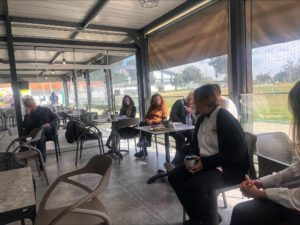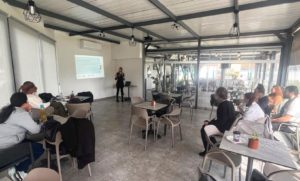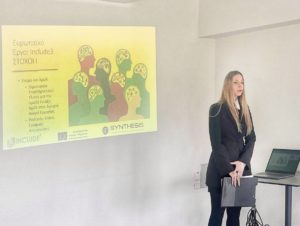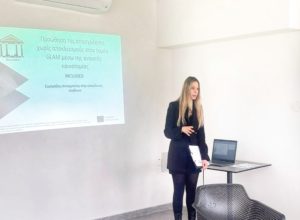Community Engagement Event in Cyprus
24th February 2024
Cyprus
On February 23, 2024, the Include3 project team held an event at “The View Cafe” to talk about helping people with intellectual disabilities join the workforce and society.
Many people attended, including experts in inclusion, psychologists, counselors, and a group of people with intellectual disabilities who advocate for themselves.
Georgia Karaoli welcomed everyone and introduced the event.
Event Activities:
The Self-Advocacy Group gave a presentation about who they are, their goals, and their plans.
They talked about how important it is for people with disabilities to represent themselves.
Georgia Karaoli then explained the Include3 project, which helps people with intellectual disabilities find jobs and be included in society.
She talked about the project’s goals and plans for the future, like creating helpful materials such as podcasts and videos.
Project Goals:
The Include3 project aims to help professionals, such as inclusion counselors, by creating a guide with practical tools and training.
There will also be an educational program for guidance counselors to help them support people with intellectual disabilities better.
Key Results and Future Plans:
The project has produced reports on best practices in Europe and is working on a guide for counselors.
Future steps include creating training programs and an online platform with resources to help people with intellectual disabilities.
In Cyprus, the discussions showed that there aren’t many job opportunities for people with intellectual disabilities due to the country’s small size.
The goal is to create an inclusive culture and help both people with disabilities and their coworkers learn how to work together.
Supporting Inclusion:
Counseling should focus on ending stereotypes and teaching good communication skills.
It’s important to support the emotional well-being of people with intellectual disabilities and help them build the skills they need for work.
Materials and Resources:
Educational materials should be easy to use and updated regularly.
Open communication between everyone involved (people with disabilities, families, employers, and counselors) is essential.
Professional Training:
Professionals in inclusion are working with the Cyprus Career Counseling Association to help people with disabilities gain independence in their work and financial lives.
Networking:
A platform is needed where employers and inclusion experts can connect to find the right people for jobs.
Conclusion:
The event was a success, with the Self-Advocacy Group playing a key role.
There was interest from a local special school in working with the project in the future.
The event ended with a social gathering where participants enjoyed snacks and drinks, and talked about ideas and future plans.
Introduction
On the morning of 23 February 2024, the Include3 project team hosted a significant event at “The View Cafe,” part of the Christou Steliou Ioannou Foundation. The session, scheduled between 10:30 and 12:15, was aimed at discussing the integration of individuals with intellectual disabilities into the workforce and society at large. The event attracted various participants, including specialists in inclusion, psychologists, ergo-therapists, counselors, and career guidance specialists. Notably, the event also saw the participation of representatives from the Self-Advocacy Group, a team of mentally disabled individuals advocating for themselves in various decision-making contexts.
Proceedings
The event commenced with the arrival and registration of participants from 10:30 to 10:40, followed by a warm welcome from Georgia Karaoli of SYNTHESIS. The first presentation, held by the Self-Advocacy Group, outlined their identity, objectives, actions, and future steps. This presentation was crucial in setting the tone for the event, emphasizing the importance of self-representation and autonomy for individuals with intellectual disabilities.
Following this, Georgia Karaoli took the stage again to introduce the Include3 project. This project, aimed at the inclusion of individuals with intellectual disabilities in the labor market and broader social context, was discussed in detail. The presentation covered the project’s overview and future directions. The project’s goal is to create supportive materials such as podcasts >> , videos >>, and graphic representations to facilitate the smooth integration of individuals with intellectual disabilities into the open labor market.
Karaoli also detailed objectives targeted at specialists and inclusion counselors, which include developing a guide with theoretical methods, practical applications, and best practices to support the transition. An educational program specifically designed for professional guidance counselors is also in development, aiming to provide the necessary tools and methodologies for effective inclusion.
Outcomes and Future Directions
The Include3 project has yielded several key outcomes, including an international report >> on best practices across Europe and the ongoing development of a guide for counselors. Future steps include the creation of a training program for counselors and an online platform featuring open educational resources.
In Cyprus, the focus group discussions highlighted the current state of the labor market, which is notably limited due to the country’s size, resulting in inadequate employment opportunities for individuals with cognitive difficulties. The creation of an inclusive culture was emphasized as a crucial part of the counseling process, requiring education for both rehabilitated adults and their future colleagues.
The counseling process should aim to eliminate stereotypes and teach effective communication strategies. Another point raised was the emotional and psychological resilience of rehabilitated individuals and how to support them in developing relevant skills and competencies.
Materials and Resources
The educational materials, as advised by professionals and guidance counselors, should be updated, user-friendly, and contextually relevant. Open channels of communication between all parties involved, including rehabilitated individuals, families, employers, employees, counselors, and other relevant professionals, are essential.
Professional Training for Transition Preparation
Professionals in the inclusion field are working closely with the Cyprus Career Counseling Association’s “Inclusion Department.” There is a focus on finding ways to support rehabilitated individuals in a manner that fosters their desire and effort for greater autonomy in their professional and economic lives.
Networking
The need for a platform where interested employers and employees or inclusion experts can communicate to match needs with available personnel was highlighted. The methodology and curriculum should promote networking skills.
Conclusion
The Include3 event at the Christou Steliou Ioannou Foundation was a pivotal moment for all participants, including the dynamic team from the Self-Advocacy Group. The discussions and presentations not only highlighted the current efforts and achievements of the Include3 project but also set the stage for future collaborations, particularly with the Christou Steliou Ioannou Special School, which expressed keen interest in future cooperation.
The event concluded with a casual gathering, offering beverages and snacks, where participants had the opportunity to network, share ideas, and show mutual respect. This social aspect of the event underscored the importance of community and collaboration in the journey toward inclusive employment and societal integration for individuals with intellectual disabilities.
In summary, the Include3 project event was a comprehensive and insightful session that not only provided valuable information on the current state and future directions of inclusion efforts but also fostered a sense of community and shared purpose among all attendees.




